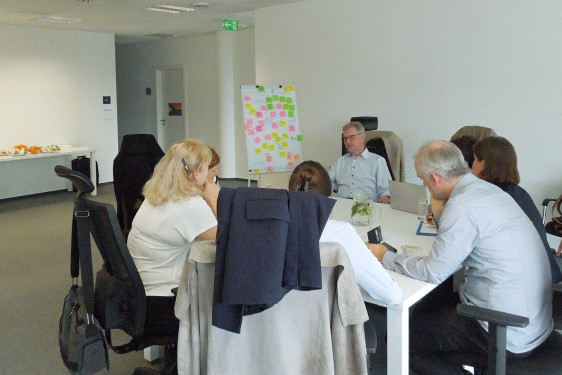Mutual Learning Event Foresight for Research & Innovation policy
06/13/2024

The first Mutual Learning Event took place on May 23, 2024 in Bratislava, Slovakia as part of the Horizon Europe project Eye of Europe, which aims to contribute to the development of the R&I foresight community and support the integration of foresight practices into R&I policy-making. Forty participants from partner organizations and external representatives of ministries, governmental bodies, funding agencies and the European institutions gathered in the premises of the Government Office of the Slovak Republic. The purpose of the Mutual Learning Events is to facilitate the exchange of information, experiences, lessons learnt in the practice of R&I foresight and other forward-looking activities across EU.
The format of the event has been designed to allow for mutual exchange and learning among participants; presentation on the European R&I foresight landscape and four country studies shared examples of foresight-based initiatives and formed the basis for discussions of two interactive sessions.
In the opening part of the event, welcoming speeches and presentation of MLE context and content were presented.
The second part of the agenda dedicated to the overview of the European R&I foresight landscape – Stocktacking of the organisation of R&I Foresight activities in the ERA (European Research Area) informed on the preliminary results of the 3 research pillars (desk research, online survey and interviews) and pointed out the key benefits of the R&I foresight activities, constraints and bottlenecks.
Four country studies (Slovakia, Finland, Austria and Sweden) have brought interesting comparisons between R&I foresight potential in Slovakia and the Finnish foresight ecosystem including the elaborate Finnish National Foresight Network at the governmental, regional and municipal level. In Austria, the role of strategic foresight has been strengthened and coordinated. The Swedish presentation introduced provocative insights to the world of the future of digital transformation through speculative design scenarios. All information presented set the stage for discussions in two interactive sessions on the emerging functions of R&I foresight and emerging approaches in R&I foresight and their PROs and CONs. The participants formed four groups, each with one moderator and one rapporteur. The overall discussion emphasized the forward-looking effect on the specification of demand and need and stressed on improvement of tools and methods for establishing dialogue with policy-making. The detailed information and outputs will be published in a separate report. Five MLEs are planned in the project, the second one will be held online in September 2024.
